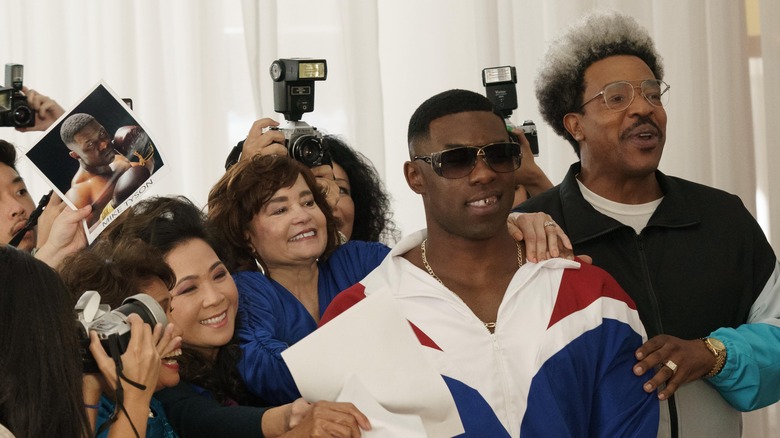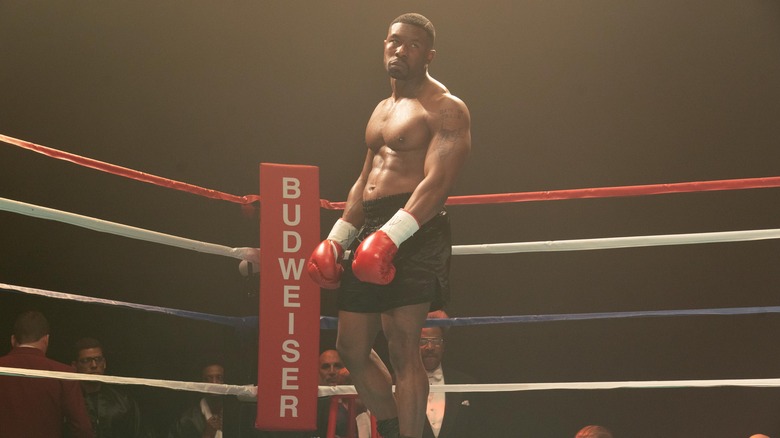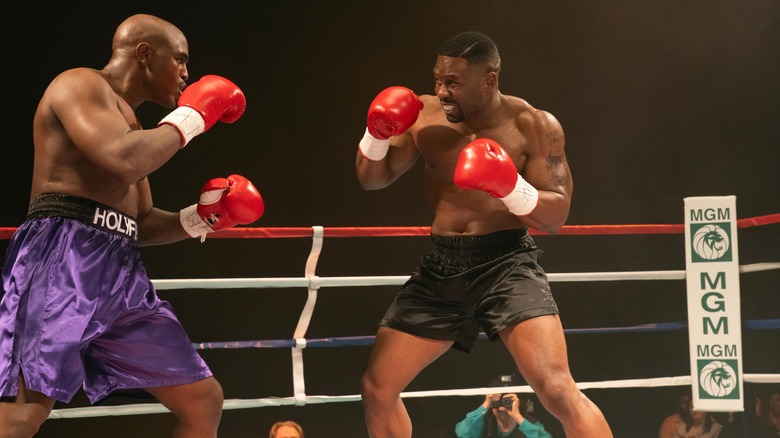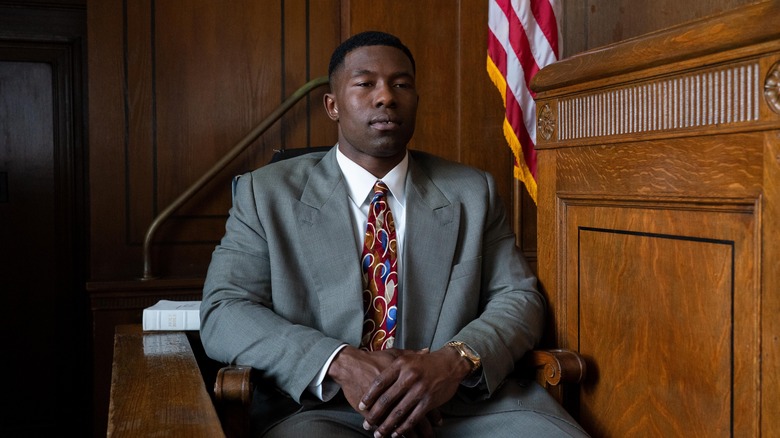Mike Review: This Highly Stylized Portrait Of Mike Tyson Pulls Its Punches
Even if you don't know Mike Tyson there's a good chance you "know" Mike Tyson. Or rather, you know the bullet points of his strange life and career: his troubled childhood, his brutal boxing career that began at such a young age, his connection to Don King, his love of pigeons, his lisp, his rape conviction, the fight where he bit off a chunk of Evander Holyfield's ear, his face tattoo, his cameo in "The Hangover," and so on. These aren't the sum of an entire life, but trivia questions, and "Mike," the new Hulu series that covers Tyson's rise and fall, sure hopes you're familiar with them, because that's almost all you're going to get.
For most of its episode, "Mike" is a surface-level look at Tyson. Allow me to get a boxing metaphor out of the way nice and early and say this: "Mike" pulls its punches. But that's not to say the show is a complete misfire, or uninteresting, or even unengaging. Created by Steven Rogers, the series is being billed as from "the team behind 'I, Tonya,'" and it shows — like that film, "Mike" attempts to find dark humor in Tyson's life, all of which is rendered at breakneck speed with stylish editing and energetic cinematography (much of which is freely "borrowed" from the work of Martin Scorsese) and an endless parade of needle drops. (It also frequently calls to mind another, more successful Hulu series — "Pam and Tommy," which, like "Mike," featured the involvement of "I, Tonya" director Craig Gillespie.)
But as "Mike" unfolded, one question came to mind: who is this guy? Who is Mike Tyson, really? Sure, he's front and center for the majority of the show, narrating the events of his life. And "Moonlight" star Trevante Rhodes, who looks like he's chiseled from marble here, does a fantastic job channeling Tyson, down to his voice and physicality. But Tyson himself remains an enigma. Perhaps that's the point. Perhaps Tyson (or at least the Tyson portrayed here) doesn't know who he is, either. Or perhaps he doesn't want us to know the truth.
'I'm not gonna lie, I have issues'
The framing device of "Mike" is presented as the boxer's one-man show on Broadway, "Mike Tyson: Undisputed Truth." After opening with Tyson biting Holyfield's ear, Tyson himself pauses the entire series and proclaims he's not going to start with that. Instead, we're suddenly transported to the backstage of his Broadway debut, and given an appropriately "Raging Bull"-like intro of Tyson talking to himself in the mirror of his dressing room.
He eventually struts out on stage in a gray suit and proceeds to regale the audience, who are clearly receptive to his stories — hooting and hollering along the way, and groaning along when Tyson talks about the people in his life he wishes he had cut out sooner, like famed promoter Don King (played in the series with great manipulative gusto by Russel Hornsby). From the Broadway stage, Tyson spins his story, running through those bullet points again: his troubled childhood with a cold mother who seems to think he's doomed and his youth of petty crime (he was arrested 38 times by the time he was 13). Eventually, as Tyson gets older, he learns to box at the Tryon School for Boys and eventually comes to the attention of famed boxing trainer Cus D'Amato. Played with crusty warmth by Harvey Keitel, Cus is the first real father figure Tyson has in his life, and he clings to this older man like he's family.
These early scenes with Tyson growing into his fighting career and becoming closer with Cus and his family are among the best, as it portrays Tyson as being overwhelmed with emotion at the prospect of finally having people in his life who treat him with love and care. The Tyson on the stage telling all this feels honest and self-deprecating — "I'm not gonna lie, I have issues," he tells the crowd. But there's something that rings hollow. Tyson is constantly turning the problematic moments in his life into punchlines, trying to shrug it all off as just another moment in his wild and crazy life. But something is missing.
Entertaining but hollow
Whatever "Mike" lacks in real insight it attempts to make up for with style, style, style. The camera never sits still, and we're treated to well-filmed boxing fights that show the heavy, rippling impact of fists pounding into flesh. We're also presented with alternative, fantasy scenarios — like when Tyson fantasizes about punching Don King in the face the first time he met him to stop the promoter from coming into his life. Rhodes anchors all these scenes with the right amount of charm, and we never for a minute doubt the power of his punch — his fights feel genuine.
But the half-hour episode of the show are too rushed, too quick. Tyson's marriage to Robin Givens, played by Laura Harrier and rendered as a controlling, money-hungry figure, flies by in the blink of an eye. Later, Tyson's adult sister shows up, seemingly from nowhere, only to then vanish. And his rise to fame happens mostly off-screen — one minute he's no one, the next, he's a superstar doing commercials and headlining video games. It's all very entertaining but still feels hollow.
And then, in episode 5, "Mike" flips the script.
Flipping the script
Only five episodes of "Mike" were made available to critics, so I cannot speak on how the show continues. But episode 5 is the moment "Mike" gives us a hint that it's not all it's cracked up to be. Rather than have Tyson narrate this emotionally taxing episode, the narration duties are instead turned over to Desiree Washington, the 18-year-old beauty queen who accused Tyson of rape. Played by Li Eubanks, Desiree is a sweet, funny, confident person — and then she goes on a date with Tyson. The moment features a devastating cut — we see Washington climb into Tyson's limo, only to then jump-cut to later in the evening, with Washington going to the hospital to report her rape.
The sexual assault happens off-screen, but the series makes the choice of having a future version of Desiree stand in the same hotel room and talk directly to the camera while the sounds of the rape can be heard faintly off-screen. It's a way to showcase that you can still imply the horror of assault without graphically showing it to the audience. It's also heartbreaking.
But most of all, this is the episode that finally gives us a look at Tyson through someone else's eyes. He's not able to use his charm and humor to talk his way out of this episode, and it paints him in a completely different light. It also reminds us that Washington was pilloried in the media and among Tyson's fans, many of whom assumed she was only accusing Tyson for money (on-screen text at the end of the episode reveals Washington never profited off her accusation in any way).
Again: I cannot confirm if this episode marks a turning point for what comes next in the series. But I can say it feels like the moment comes a little too late. I appreciate that the series is attempting to give us a glorified look at Tyson before pulling the rug out from under our feet, but if the story simply pivots back to Tyson telling jokes to his audience, it will be all for not.
But to be fair, "Mike" is not a history lesson. It's pop entertainment, and on that front, it does its job. Rhodes makes for a strong lead (why hasn't Hollywood used him more often? Give him more work!), and the series is never, ever boring. I just wish it were more of a knock-out.
"Mike" premieres Thursday, August 25, 2022, on Hulu.



